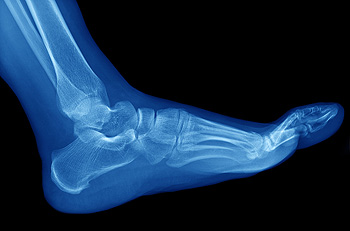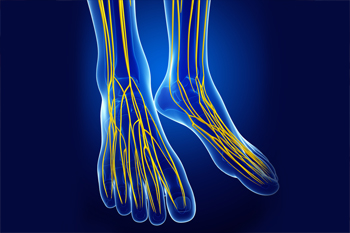Items filtered by date: March 2021
Elevation May Bring Relief to Stress Fractures in the Feet
 The bones that are located in the feet can be affected by stress fractures. Stress fractures are hairline fractures that can gradually develop from overuse. They can form as a result of a sudden change in footwear, running on uneven surfaces, or suddenly increasing the intensity in running and jumping activities. Common symptoms that many patients experience can include tenderness surrounding the injured area, in addition to severe pain when the activity is completed. Mild relief can be found when the affected foot is elevated, and this may help to increase circulation to the heart. If you feel you have endured a stress fracture in your foot, it is advised that you seek the counsel of a podiatrist who can properly diagnose and treat stress fractures.
The bones that are located in the feet can be affected by stress fractures. Stress fractures are hairline fractures that can gradually develop from overuse. They can form as a result of a sudden change in footwear, running on uneven surfaces, or suddenly increasing the intensity in running and jumping activities. Common symptoms that many patients experience can include tenderness surrounding the injured area, in addition to severe pain when the activity is completed. Mild relief can be found when the affected foot is elevated, and this may help to increase circulation to the heart. If you feel you have endured a stress fracture in your foot, it is advised that you seek the counsel of a podiatrist who can properly diagnose and treat stress fractures.
Stress fractures occur when there is a tiny crack within a bone. To learn more, contact one of our podiatrists from Parkwood Podiatry. Our doctors can provide the care you need to keep you pain free and on your feet.
How Are They Caused?
Stress fractures are the result of repetitive force being placed on the bone. Since the lower leg and feet often carry most of the body’s weight, stress fractures are likely to occur in these areas. If you rush into a new exercise, you are more likely to develop a stress fracture since you are starting too much, too soon. Pain resulting from stress fractures may go unnoticed at first, however it may start to worsen over time.
Risk Factors
- Gender – They are more commonly found in women compared to men.
- Foot Problems – People with unusual arches in their feet are more likely to develop stress fractures.
- Certain Sports – Dancers, gymnasts, tennis players, runners, and basketball players are more likely to develop stress fractures.
- Lack of Nutrients – A lack of vitamin D and calcium may weaken the bones and make you more prone to stress fractures
- Weak Bones – Osteoporosis can weaken the bones therefore resulting in stress fractures
Stress fractures do not always heal properly, so it is important that you seek help from a podiatrist if you suspect you may have one. Ignoring your stress fracture may cause it to worsen, and you may develop chronic pain as well as additional fractures.
If you have any questions, please feel free to contact our offices located in Brunswick and Hinesville, GA . We offer the newest diagnostic and treatment technologies for all your foot care needs.
What Is Idiopathic Peripheral Neuropathy
 Idiopathic peripheral neuropathy refers to damage of the peripheral nerves where cause can not be determined. When the peripheral nerves are damaged, there are often symptoms that affect the feet. These can include numbness, a tingling or burning sensation, pain, a loss of sensation, muscle weakness, muscle spasms, or difficulty moving the lower limbs. Treatment for idiopathic peripheral neuropathy that affects the lower limbs focuses on managing the symptoms of the disease. Certain medications or physical therapy may be suggested. Mobility aids, such as orthotic shoes, canes, or braces may be prescribed to help you balance and walk. For more information about peripheral neuropathy, please consult with a podiatrist.
Idiopathic peripheral neuropathy refers to damage of the peripheral nerves where cause can not be determined. When the peripheral nerves are damaged, there are often symptoms that affect the feet. These can include numbness, a tingling or burning sensation, pain, a loss of sensation, muscle weakness, muscle spasms, or difficulty moving the lower limbs. Treatment for idiopathic peripheral neuropathy that affects the lower limbs focuses on managing the symptoms of the disease. Certain medications or physical therapy may be suggested. Mobility aids, such as orthotic shoes, canes, or braces may be prescribed to help you balance and walk. For more information about peripheral neuropathy, please consult with a podiatrist.
When dealing with systemic disease of the feet, it is extremely important to check the affected areas routinely so that any additional problems are caught quickly. If you have any concerns about your feet and ankles contact one of our podiatrists from Parkwood Podiatry. Our doctors will assist you with all of your podiatric needs.
Systemic Diseases of the Feet
Systemic diseases affect the whole body, and symptoms usually are displayed in the feet. This condition can make a patient’s ability to walk unbearable. Systemic diseases include gout, diabetes mellitus, neurological disorders, and arthritis.
Gout – is caused by an excess of uric acid in the body. Common symptoms include pain, inflammation, and redness at the metatarsal/phalangeal joint of the base big toe. Gout can be treated by NSAIDs to relieve pain and inflammation, and other drugs that lower the acid levels in the body.
Diabetes mellitus – is an increase in the level of blood sugar that the body cannot counteract with its own insulin. Failure to produce enough insulin is a factor in Diabetes.
Diabetes of the Feet
Diabetic Neuropathy – may lead to damaged nerves and affect the feet through numbness and loss of sensation.
Peripheral Vascular Disease – can restrict the blood flow to the feet, and often times lead to amputation of the feet.
If you have any questions please feel free to contact our offices located in Brunswick and Hinesville, GA . We offer the newest diagnostic and treatment technologies for all your foot and ankle needs.
Different Causes of Foot Pain
 Our feet undergo a lot of use over our lifetime, and as a result, a variety of painful issues can develop. Bunions, which causes the big toe to turn towards the other toes, can lead to a lot of pain while walking. Plantar fasciitis, which is the inflammation of the tendon that runs along the bottom of the foot, can often lead to heel pain and pain in the arch of the foot. Another common source of heel pain is heel spurs. These occur as bony bumps in the heel that are calcium deposits. Other issues, like gout, can lead to a burning sensation in the foot. Gout is caused by an excess of uric acid in the body that builds up in the joints. Some issues can lead to numbness in the foot, and this numbness usually indicates Morton’s neuroma which is the thickening of the nerve around the ball of the foot. If you are struggling with pain in your feet, consulting with a podiatrist is recommended. A podiatrist will be able to help find the source and a proper treatment method.
Our feet undergo a lot of use over our lifetime, and as a result, a variety of painful issues can develop. Bunions, which causes the big toe to turn towards the other toes, can lead to a lot of pain while walking. Plantar fasciitis, which is the inflammation of the tendon that runs along the bottom of the foot, can often lead to heel pain and pain in the arch of the foot. Another common source of heel pain is heel spurs. These occur as bony bumps in the heel that are calcium deposits. Other issues, like gout, can lead to a burning sensation in the foot. Gout is caused by an excess of uric acid in the body that builds up in the joints. Some issues can lead to numbness in the foot, and this numbness usually indicates Morton’s neuroma which is the thickening of the nerve around the ball of the foot. If you are struggling with pain in your feet, consulting with a podiatrist is recommended. A podiatrist will be able to help find the source and a proper treatment method.
Foot Pain
Foot pain can be extremely painful and debilitating. If you have a foot pain, consult with one of our podiatrists from Parkwood Podiatry. Our doctors will assess your condition and provide you with quality foot and ankle treatment.
Causes
Foot pain is a very broad condition that could be caused by one or more ailments. The most common include:
- Bunions
- Hammertoes
- Plantar Fasciitis
- Bone Spurs
- Corns
- Tarsal Tunnel Syndrome
- Ingrown Toenails
- Arthritis (such as Gout, Rheumatoid, and Osteoarthritis)
- Flat Feet
- Injury (from stress fractures, broken toe, foot, ankle, Achilles tendon ruptures, and sprains)
- And more
Diagnosis
To figure out the cause of foot pain, podiatrists utilize several different methods. This can range from simple visual inspections and sensation tests to X-rays and MRI scans. Prior medical history, family medical history, and any recent physical traumatic events will all be taken into consideration for a proper diagnosis.
Treatment
Treatment depends upon the cause of the foot pain. Whether it is resting, staying off the foot, or having surgery; podiatrists have a number of treatment options available for foot pain.
If you have any questions, please feel free to contact our offices located in Brunswick and Hinesville, GA . We offer the newest diagnostic and treatment technologies for all your foot care needs.
Signs Your Heel Pain Might Be Plantar Fasciitis
Plantar f asciitis occurs when the plantar fascia, the band that runs along the bottom of the foot from the heel to the toes, becomes inflamed. Plantar fasciitis usually causes pain in the heel, which is often worse in the morning, after prolonged standing, or after an intense workout. Usually, the pain that comes from plantar fasciitis gradually worsens over time. Plantar fasciitis is an overuse injury that comes from an activity that puts stress on the plantar fascia, like running, but it can also be caused by other medical conditions, such as flat feet or obesity. Because plantar fasciitis can negatively impact your daily activities, patients who are suffering from heel pain should be under the care of a podiatrist for a proper diagnosis and treatment plan.
asciitis occurs when the plantar fascia, the band that runs along the bottom of the foot from the heel to the toes, becomes inflamed. Plantar fasciitis usually causes pain in the heel, which is often worse in the morning, after prolonged standing, or after an intense workout. Usually, the pain that comes from plantar fasciitis gradually worsens over time. Plantar fasciitis is an overuse injury that comes from an activity that puts stress on the plantar fascia, like running, but it can also be caused by other medical conditions, such as flat feet or obesity. Because plantar fasciitis can negatively impact your daily activities, patients who are suffering from heel pain should be under the care of a podiatrist for a proper diagnosis and treatment plan.
Plantar fasciitis is a common foot condition that is often caused by a strain injury. If you are experiencing heel pain or symptoms of plantar fasciitis, contact one of our podiatrists from Parkwood Podiatry. Our doctors can provide the care you need to keep you pain-free and on your feet.
What Is Plantar Fasciitis?
Plantar fasciitis is one of the most common causes of heel pain. The plantar fascia is a ligament that connects your heel to the front of your foot. When this ligament becomes inflamed, plantar fasciitis is the result. If you have plantar fasciitis you will have a stabbing pain that usually occurs with your first steps in the morning. As the day progresses and you walk around more, this pain will start to disappear, but it will return after long periods of standing or sitting.
What Causes Plantar Fasciitis?
- Excessive running
- Having high arches in your feet
- Other foot issues such as flat feet
- Pregnancy (due to the sudden weight gain)
- Being on your feet very often
There are some risk factors that may make you more likely to develop plantar fasciitis compared to others. The condition most commonly affects adults between the ages of 40 and 60. It also tends to affect people who are obese because the extra pounds result in extra stress being placed on the plantar fascia.
Prevention
- Take good care of your feet – Wear shoes that have good arch support and heel cushioning.
- Maintain a healthy weight
- If you are a runner, alternate running with other sports that won’t cause heel pain
There are a variety of treatment options available for plantar fasciitis along with the pain that accompanies it. Additionally, physical therapy is a very important component in the treatment process. It is important that you meet with your podiatrist to determine which treatment option is best for you.
If you have any questions, please feel free to contact our offices located in Brunswick and Hinesville, GA . We offer the newest diagnostic and treatment technologies for all your foot care needs.
How Seniors Can Care for Their Feet
 Because the foot is made up of 26 bones, plus a variety of tendons, ligaments, muscles and joints, proper foot care is very important. As our bodies age, the feet experience a lot of wear and tear and other chronic health conditions begin to develop. Therefore, foot care becomes even more important for seniors. Seniors should do daily foot checks to monitor sores, cracks and cuts as well as check for infections. They should also wash their feet daily and make sure that they are dried thoroughly. Keeping the toenails trimmed straight across can help to prevent ingrown toenails. Shoes should fit properly and help protect the feet from extreme hot or cold temperatures. Moisturizing cream should be used to help keep the skin soft. Seniors who are dealing with corns, calluses, bunions or any other foot related issues should visit a podiatrist for proper care.
Because the foot is made up of 26 bones, plus a variety of tendons, ligaments, muscles and joints, proper foot care is very important. As our bodies age, the feet experience a lot of wear and tear and other chronic health conditions begin to develop. Therefore, foot care becomes even more important for seniors. Seniors should do daily foot checks to monitor sores, cracks and cuts as well as check for infections. They should also wash their feet daily and make sure that they are dried thoroughly. Keeping the toenails trimmed straight across can help to prevent ingrown toenails. Shoes should fit properly and help protect the feet from extreme hot or cold temperatures. Moisturizing cream should be used to help keep the skin soft. Seniors who are dealing with corns, calluses, bunions or any other foot related issues should visit a podiatrist for proper care.
Proper foot care is something many older adults forget to consider. If you have any concerns about your feet and ankles, contact one of our podiatrists from Parkwood Podiatry. Our doctors can provide the care you need to keep you pain-free and on your feet.
The Elderly and Their Feet
As we age we start to notice many changes in our body, but the elder population may not notice them right away. Medical conditions may prevent the elderly to take notice of their foot health right away. Poor vision is a lead contributor to not taking action for the elderly.
Common Conditions
- Neuropathy – can reduce feeling in the feet and can hide many life-threatening medical conditions.
- Reduced flexibility – prevents the ability of proper toenail trimming, and foot cleaning. If left untreated, it may lead to further medical issues.
- Foot sores – amongst the older population can be serious before they are discovered. Some of the problematic conditions they may face are:
- Gouging toenails affecting nearby toe
- Shoes that don’t fit properly
- Pressure sores
- Loss of circulation in legs & feet
- Edema & swelling of feet and ankles
Susceptible Infections
Diabetes and poor circulation can cause general loss of sensitivity over the years, turning a simple cut into a serious issue.
If you have any questions please feel free to contact our offices located in Brunswick and Hinesville, GA . We offer the newest diagnostic and treatment technologies for all your foot and ankle needs.
